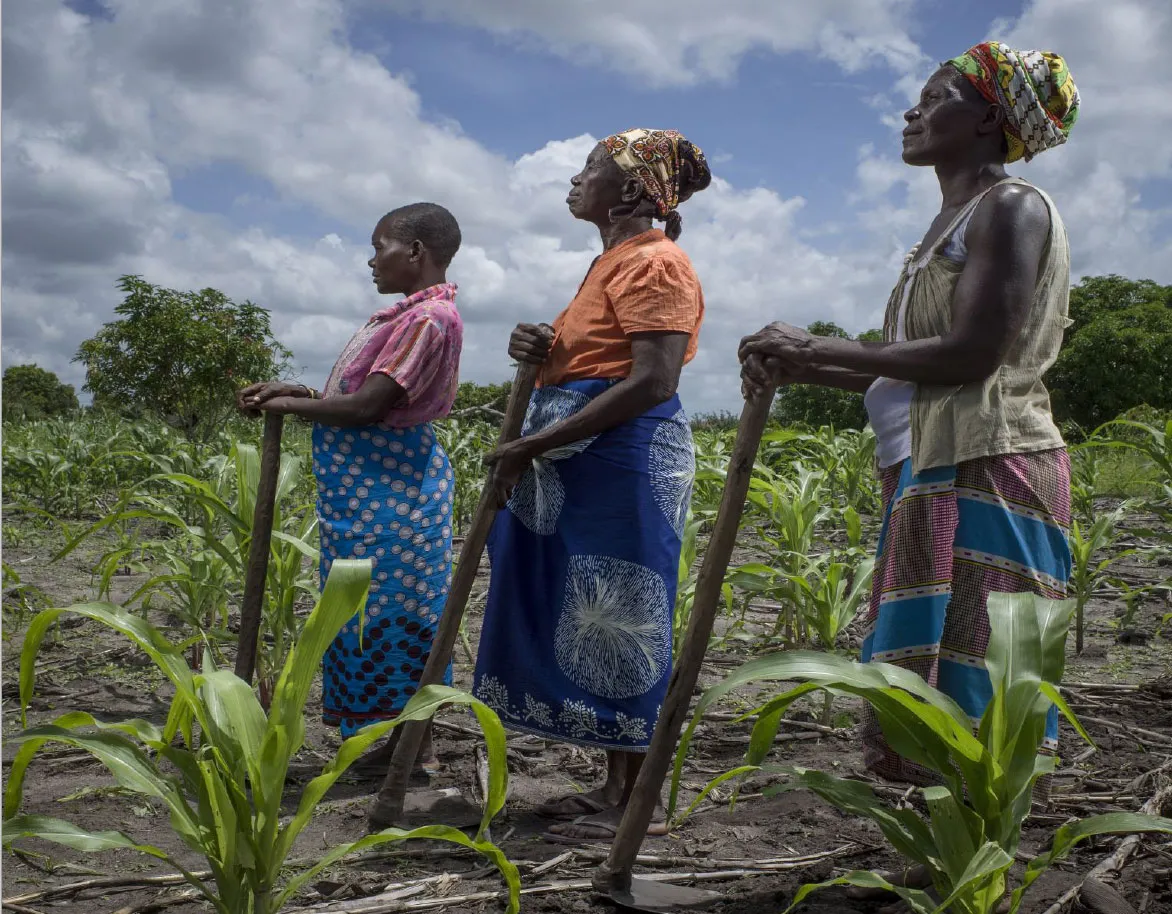Introduction
This year’s Food and Water Systems Annual Report is a special one. Achieving Food and Nutrition Security & Resilience to Climate Change is about accomplishments, and commitments – new and old – and the challenges that we face in getting there.
In 2014, the CARE 2020 Program Strategy was approved. The first ever organization-wide strategy in CARE’s seventy years of history, committing to supporting 150 million of the most vulnerable people worldwide, including a goal to reach 50 million poor and vulnerable women, girls, men and boys to increase their food and nutrition security and their resilience to climate change by 2020. It was an extremely ambitious goal, deliberately so, with the intention to further facilitate the organization’s commitment to be driven by impact.
We knew that traditional programming implementation alone would never bring us there, and that we would need to change the way we operated in order to reach that goal. And that is exactly what we did. Over the past six years, we have established new ways of working, ensuring extensive coordination and better programming alignment across the CARE Confederation. We developed She Feeds the World (SFtW), a new systems’ based strategic framework, capturing the best of what CARE does in our food and nutrition security programing and advocacy, to guide our global work. We intentionally brought women and girls in the center of our food and nutrition security (FNS) programing, at the heart of what we do, because we know that we cannot overcome poverty until all people have equal rights and opportunities.
We brought together our humanitarian and development programing, as a nexus. We improved our monitoring and evaluation systems and our knowledge and management capacities. We tested and disseminated new tools and models such as the Farmer Field and Business Schools and the Collective Impact for Nutrition approach. We expanded our donors’ base and significantly augmented our funding for food security and nutrition. We promoted new partnerships and we advocated for local, national, and global policy changes to improve the food security and nutrition of millions of people around the world. No doubt it was gargantuan task, carried out during a time when hunger globally started to rise for the first time in decades, due to political instability, growing inequality, the rise of new conflicts, and the increasing impacts of climate change.
Each of these tremendous efforts paid off, as we can now proudly declare that CARE fulfilled the ambitious goal and our commitment to increasing the food security and nutrition for 48,989,602 people globally by 2020.
However, our work is not done. With this report, we reflect on CARE’s impact over the past five years—taking stock and highlighting of some of the key impacts, lessons learned, and successes we’ve had along the way. First and foremost, Achieving Food and Nutrition Security & Resilience to Climate Change is a tribute to the many, many people, from across CARE and our partners and allies, without whom this would not have been possible.
We also observe this opportunity to consider our vision of achieving global food and nutrition security going forward by aggressively addressing the injustices in global food and water systems; particularly in the context of increasing frequency and intensity of conflicts and natural disasters, pervasive inequity, population growth, increasing climate change and variability, and a depleting natural resource base.
In 2020, CARE developed a new shared vision for the decade ahead, CARE’s 2030 Vision: Harnessing collective power to fight poverty, and achieve social justice, including the Right to Food, Water and Nutrition Impact Area Strategy, which lays out our priorities to transform food and water systems, as well as the organizational identity we need to embrace and the resource considerations required to accomplish another ambitious goal: to ensure the fulfillment of the right to adequate and nutritious food and clean water for all by promoting sustainable, productive, equitable and resilient (SuPER) food and water systems, while ensuring equitable, livable incomes and dignified livelihoods.
Undoubtedly, the challenges are immense. For food and water systems to be equitable, we must tackle poverty from a multi-dimensional perspective. Inequality and power imbalances – at household, community, national and global levels – constrain the ability of food systems and water to deliver poverty reduction. And the context in which we are working are not improving. The world is currently facing a famine pandemic of biblical proportions. The UN estimates that the number of people affected by chronic hunger in 2020 rose by more than in the previous five years combined. Reversing this situation will likely take years, if not decades.
Everyone has a right to nutritious food and clean water. The world produces enough food for everyone to eat, yet still so many go hungry. It does not have to be that way. We believe that a world without hunger and malnutrition and water scarcity is possible. We believe too that food and water systems must be more equitable, and thus are wholeheartedly committed to ensure that, by 2030, at least 75 million people, the majority women and girls, will increase their fulfillment of their right to adequate food, water and nutrition thanks to CARE and our partners. In so doing, CARE’s Food and Water Systems team strives to empower citizens, hold governments accountable, and foster collective action to eradicate hunger and malnutrition, and provide everyone access to safe, affordable drinking water and adequate sanitation and hygiene.
With your help, we will make it happen.
Juan Echanove
Senior Director Food and Water Systems
CARE USA

